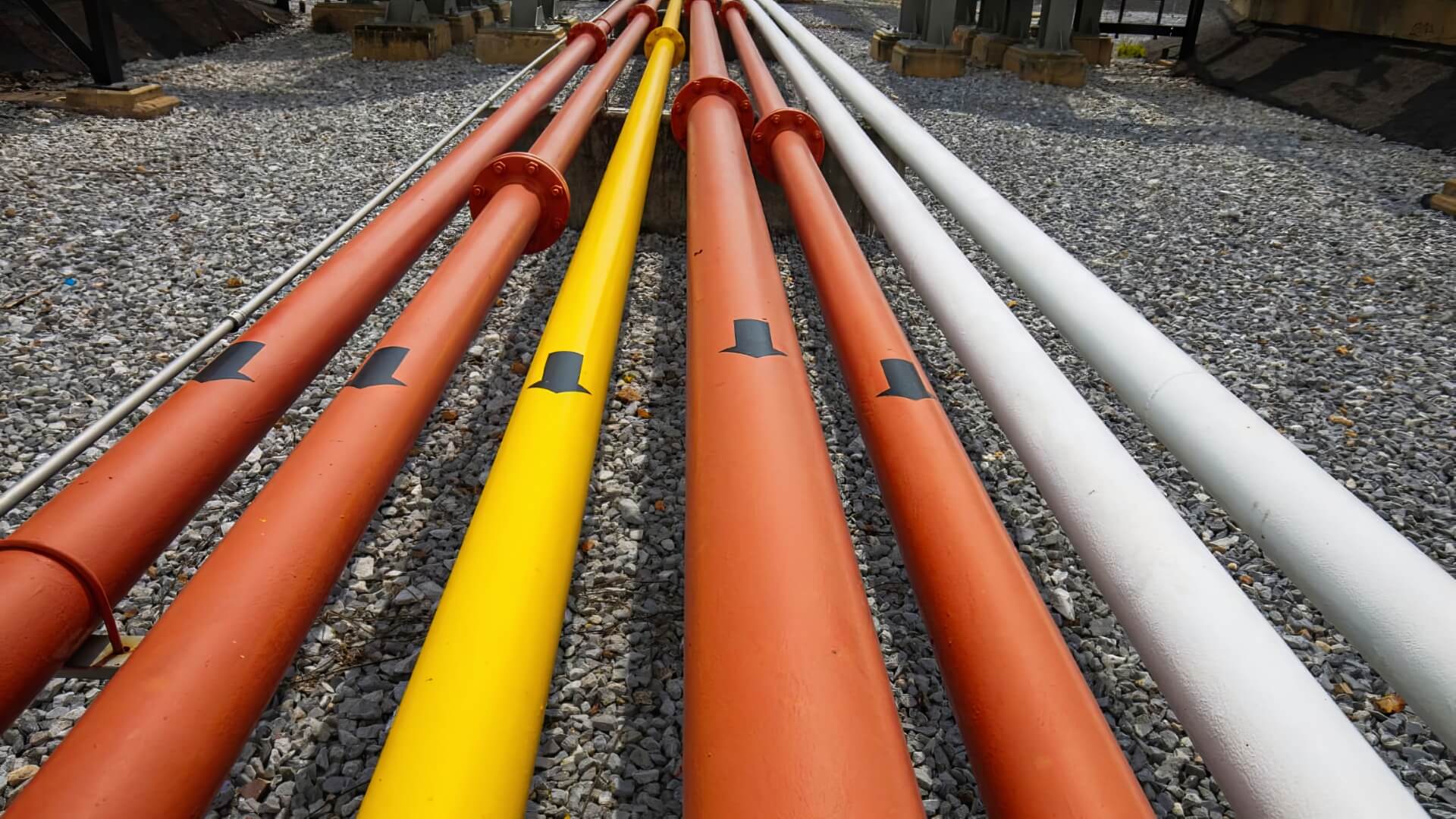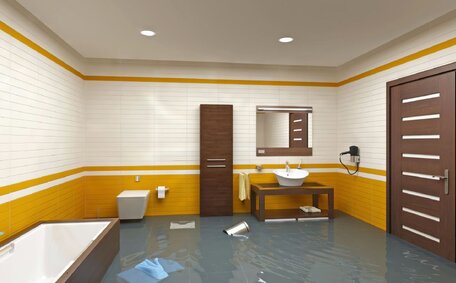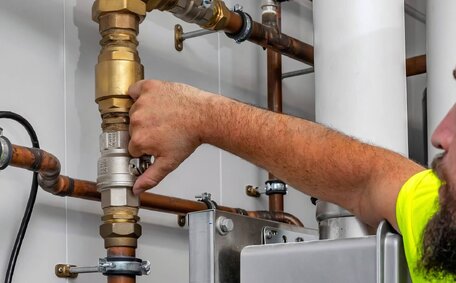Common causes of sewer blockages
Some of the most common causes sewer blockages include:
- Flushing inappropriate items down toilets such as wet wipes, sanitary products, dental floss, and kitty litter
- Depositing fats, oils, and grease into drains can create stubborn blockages within sewer lines.
- Root intrusion from nearby trees can obstruct your sewer line, causing blockages.
- A build-up of waste, hair, and other debris accumulating in the sewer main over time
- Structural issues like broken pipes or collapsed sewer pipe sections
- Heavy rainfall can lead to sewage backup when the capacity of sewer systems becomes overwhelmed
Mindful use of toilets and sinks is vital for averting clogs in your home’s sewer system. Proper disposal of oils grease and limited use of drain cleaners also help prevent damages to the main sewage line that may harm your sewer. Regular inspections and swift repairs are essential to address tree roots that may intrude into sewer lines in search of moisture.
Signs of a sewer system problem
There are several warning signs that your system is experiencing sewer issues to be aware of:
- Unpleasant odours - Noticeable foul gas smells coming from floor drains or toilets suggest sewer gases may be escaping into your home due to a crack or a sewer line blocked.
- Gurgling sounds - Loud gurgling noises coming from toilet bowls or sinks when water drains away indicate the beginning of a sewer blockage.
- Backed up drains - Slow draining fixtures, or Drains and toilets that overflow may point to obstructions in your pipes, indicating a sewer issue.
- Wet spots - Persistently soggy soil or pools of standing water in your yard around your home’s foundations or your septic system could mean cracked pipes.
- Lush vegetation growth - Excessively green grass or dense shrubbery flourishing above or near septic tanks demonstrate leaking nutrient-rich water.
Promptly addressing these indicators can avert serious sewer complications and property damage.
Preventive measures for sewer maintenance
Proactive maintenance can prevent the inconvenience of sewer backups and save on costly future repairs. Some key preventive measures a plumber can recommend include:
- Regularly inspecting your plumbing system and clearing drains - This allows early detection and remedy if you suspect your plumbing might face major obstacles.
- Only flush toilet paper and human waste, as other items like wipes and dental floss can block pipes.
- Setting up hair catchers and drain screens can prevent hair, debris, fats, oils, and grease from creating blockages.
- Prevent drain blockages by disposing of fats, oils, and grease in a container, then discarding it in the trash once solidified.
- Using a drain maintainer product monthly - This practice can help prevent issues that could potentially damage your sewer line, ensuring a clear flow.
- Repairing any leaks or structural issues with sewer pipes - Left unaddressed, system can fail due to worsening cracks and root infiltration.
- Reducing water usage during wet weather - In many cases, minimising water consumption on rainy days can work to your system’s benefit to prevent sewer overflows.
Implementing these steps, alongside periodic sewer repair and maintenance checks by your plumber, reduces the risks of future sewer dilemmas considerably.
DIY troubleshooting tips
Homeowners might resolve minor clogs with these do-it-yourself sewer troubleshooting strategies before seeking professional help:
- Use a plunger over the drain for several minutes, repeating a few times as a starting method for how to unblock potential clogs
- To address a blockage our team often suggest pouring 1⁄2 cup baking soda and 1⁄2 cup vinegar down the drain, wait 10-15 minutes, then wash away with hot water to dissolve grease or organic debris
- If several drains are sluggish, inspect your roof’s vent pipes for obstructions and remove any debris or leaves.
- Use a drain snake to clear blockage caused by hair and debris from drains pipes, where tangles often occur deeper in the system
- Don protective gloves when using plungers or drain snakes to maintain cleanliness and prevent contamination.
If DIY remedies fail and backups occur, stop attempts, restrict access to the area, and call a professional plumber to address sewage problems and minimise health risks and property damage.
When to call a professional plumber
Calling a professional plumber is crucial when DIY efforts to clear a blockage have failed, which could result in claims on your insurance, especially if it leads to sewage backing up into your home’s sewer system, or when there are major signs of sewer system failure. The Moorebank Plumbing team is available 24/7 to tackle any plumbing emergency, so don’t hesitate to reach out to your trusted Moorebank plumbers. Call us immediately to know what to do when you experience:
- Sewage overflows from multiple fixtures or toilets in your home
- A continuous sewer gas odour inside your home
- Back up in sinks, showers, or bathtubs indicate potentially damaged blocked pipes with very slow drainage
- Pools of standing water or soggy soil that only affect areas around your septic system could indicate a sewer drain issue
- Ongoing gurgling noises emerging from your home’s drainage system
- Toilet water overflowing when flushed
Experts employ high-pressure jetting techniques to rapidly remove stubborn clogs from main drains.
By acting fast to contain overflows and hazardous sewer gas leaks, we can prevent contamination risks, property damage from flooding, and potential mould issues. With a drain camera and advanced CCTV pipe inspections, we can also assess damage and pinpoint underlying causes whether it is intruding tree roots, pipe fractures, or general wear and tear.
For urgent assistance or to schedule routine sewer maintenance, Moorebank residents should contact their professional plumbers at 1300 349 338 or email us at [email protected].
Safety precautions when dealing with sewage
Sewage exposure poses a major health hazard, so safety gear and proper precautions are essential when handling any sewage overflow or blockage. Key guidelines include:
- Wear protective clothing such as rubber gloves, eye protection, masks, and boots when working near sewage
- Thoroughly wash hands and arms with antibacterial soap after handling equipment or coming into contact with sewage where contamination can occur
- Keep your family, especially small children and pets, away from contamination until areas are properly disinfected and clean up is complete
- Deploy warning signs and barriers to isolate areas impacted by sewage system problems, like indoor or garden overflows.
- Disinfect all surfaces touched by sewage with products containing chlorine bleach
- Refrain from unclogging blockages bare-handed and ensure raw sewage does not infiltrate any area of your dwelling.
- Ensure main sewage plumbing fixtures like toilets and floor drains have secured caps when not in use
- Call professional assistance rather than attempting to manage a sewer spill on your own
Following safety protocols prevents bacteria and serious infections like E. coli when making direct contact with sewage during any sewer emergency. Don’t take risks with potential plumbing problems including sewage exposure in your home’s plumbing system.
Environmental impact of sewage overflows
Sewage overflows can have major environmental consequences by allowing pollution to flow into local water supplies. Untreated sewage exposure poses extreme risks to local aquatic ecosystems and wildlife. It depletes oxygen levels and introduces bacteria, viruses, heavy metals and toxic chemicals into natural habitats.
Regular sewage spills into the city sewer threaten public health, kill fish and underwater vegetation, and render recreational waterways unsafe for human use. Nutrient pollution from sewage can lead to rampant algae proliferation and disturb aquatic life.
The best way to prevent overflows is proper maintenance to sewerage infrastructure. However, factors like ageing pipes, tree root infiltration, flushable wipe blockages, and stormwater runoff overload contribute to sewer problems resulting in around 75,000 sewage spills nationally across Australia each year according to Sydney Water’s Environmental Commitment Report.
Upgrading sewer lines, reducing system inputs, and increasing treatment plant, wet weather storage and pipe capacity can mitigate overflows. But preventing blockages and leaks through measures like public education campaigns against flushing wipes is the most effective strategy.
Septic system basics and maintenance
A septic system is an onsite sewage treatment solution, an integral part of the broader sewage system used in areas not connected to main sewer lines. It consists of a septic tank and a soil absorption or leach field to naturally filter waste water.
Septic tanks, a property owner’s responsibility for primary treatment, are impermeable containers often crafted from concrete, fibreglass, or plastic. Heavy solids settle to the bottom as sludge while oils and grease float to the top as scum, which can allow clarified effluent in the middle to flow out to the soil leach field.
Key septic system maintenance tips:
- Inspect tanks annually and have the sludge pumped out every 3-5 years
- Employ septic-friendly bathroom cleaners to preserve the essential bacteria within the system.
- Have the leach field checked for any wet spots, odours or lush grass growth
- Make sure roof gutters and stormwater drains divert precipitation away from the leach field
- Save water and stagger laundry cycles to avoid hydraulic overburden on the system
In regions with significant health risks, such as the southeast, regular maintenance can prolong a sewage system’s lifespan beyond 50 years.
All septic owners, who responsible for the system’s upkeep, should keep a detailed record of desludging, inspections, plumbing changes and repairs.
Legal obligations of wastewater system owners
Property owners with onsite wastewater systems, such as septic tanks, must meet legal obligations to operate their systems safely, avoiding health and environmental risks, and address issues promptly. Key responsibilities include:
- Arranging regular desludging, inspections, and any necessary upgrades or repairs by licenced plumbers to have a plumber fix the problem and keep the system compliant
- Not exceeding the system’s waste load capacity based on the number of bedrooms and occupants
- Guarding against hydraulic overloading by spacing out laundry loads and other heavy water use
- Exercising caution with cleaning products, chemicals or materials discharged into sinks or drains for they can damage beneficial wastewater bacteria or contaminate surroundings
- Decommission old septic systems if unresolved blockages persist, connecting the property to the main sewer line as required by local regulations.
- Monitoring the soil absorption area and taking prompt action in case of odours, wet spots or excessive vegetation indicating problems
- Maintaining accurate records of desludging, repairs, upgrades, permits and approvals
Neglecting fundamental wastewater system stewardship responsibilities can result in penalties, with large fines applicable for causing environmental harm through leakage, overflows or contamination. For guidance on maintaining standards to keep sewage issues from encroaching into the home, contact Moorebank Plumbing at 1300 349 338.






